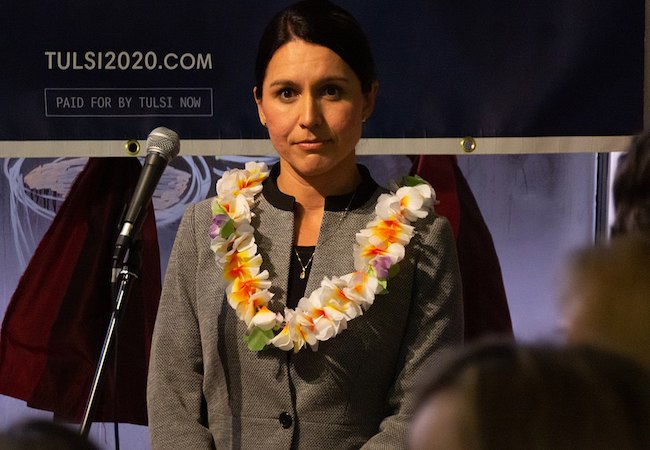2020 hopefuls: Outshine your opponents on Syria

By Michele MacMillan
The 2020 hopefuls have notched two debates on their belts as part of their months-long slog through twelve debates, triggering the expected flurry of analysis among the media and opinion leaders. In September, a winnowed field will jostle in Houston to outshine the competition and ensure their run for the White House ignites. But while their domestic policy positions provide ample choice to the American voter, scarce few have charted their course in foreign policy—and little was illuminated at the first two rounds. A key question remains: who has what it takes to be Commander-in-Chief? Beyond the Great Power competition among the United States, Russia, and China, the overwhelming humanitarian crisis in Syria serves as the best platform on which the candidates can offer a compelling vision that sets them apart from both their Democrat colleagues and President Trump.
A province smaller than Connecticut is the entry point. In northwest Syria, this last remaining rebel-held area, Idlib, is home to more than 3 million Syrians, including some 1.3 million of whom are already internally displaced, in what’s become a de facto “open-air prison.” The last four months, government forces loyal to Bashar al-Assad have ramped up the violence, shelling and bombing their way through the countryside in violation of a Russian-Turkish “ceasefire” that has been anything but. Additional ceasefires have ceased to have meaning.
At first glance, the scene is all too familiar. We saw events unfold similarly in Aleppo in 2016 during the last presidential election (remember Gary Johnson’s cringe-inducing “What is Aleppo?”). Rebel-held areas are being painfully squeezed as government forces seize homes and displace hundreds of thousands, moving ever closer to the closed Turkish border. Medical centers and clinics are primary targets of Assad-regime and Russian bombing, precipitating rapidly declining health services in an area already struggling to attend to its sick and wounded. According to the Syrian American Medical Society (SAMS), at least 25 health and medical facilities have been attacked in Idlib since April.

Yet one crucial fact sets Idlib apart: it is the final province beyond the reach of the Assad regime’s ground forces, detention and forced conscription. If Idlib falls, the Assad regime will claim military victory, shattering all hope for UN peace negotiations.

Millions of lives are at stake. So far, however, only Sen. Elizabeth Warren put out a public statement on the escalation of violence in Idlib, naming Russia and Assad as its culprits. None of her competitors have made a peep—not even Joe Biden who, as former Vice President in 2011, was intimately involved in shaping the U.S. response to Syria’s unfolding crisis. Nor have Afghanistan War veteran Pete Buttigieg, Sen. Bernie Sanders, or some of the lesser-known contestants like Iraq War veteran Rep. Seth Moulton, former Colorado Governor John Hickenlooper and Sen. Amy Klobuchar.
Only Rep. Tulsi Gabbard of Hawaii comments regularly on Syria, and with disastrous results. Fortunately, candidates like Sen. Kamala Harris of California have begun to call out her “embrace” of Assad.
This isn’t just about civilians in danger—this is about U.S. national security interests. What happens in Syria doesn’t stay in Syria, which makes the candidates’ near-silence concerning.
Stability in Syria touches on numerous U.S. interests, including those Assad, Russia and Iran love to thwart. Protecting civilians in Idlib is crucial to the larger strategy of countering the very real threat of an ISIS resurgence, defending Israel from Iranian aggression, mitigating Russia’s leverage in the region and preventing a humanitarian catastrophe and renewed refugee flow. Across two administrations, the United States has taken a back seat in regional policy, allowing Russia and Iran to grow their influence, to the detriment of civilian lives and American foreign policy interests and power projection.

For those candidates well-established with foreign policy pedigrees—and those working hard to burnish their credentials—Idlib must become central to their rhetoric on the campaign trail. The 2020 candidates should make the case to voters through vocal public statements against the violence happening in Idlib and condemning the acts of Assad and Russia’s military and financial backing. They must call for the international community to unify against the bombing of hospitals, schools and trapped civilians.

And don’t let the Trump Administration get away with inaction. Instead, candidates must push Congress and the Administration to pass and sign the Caesar Syria Civilian Protection Act, a crucial economic tool to stopping the violence and reclaiming America’s moral leadership on human rights.
2020 hopefuls wanting to demonstrate their ability to become Commander-in-Chief have an opportunity in Syria. Standing apart from the crowd and helping shape Syria policy are good objectives. Sparing thousands of lives and standing up for human rights is the right thing to do.
Michele MacMillan is a fellow at Americans for a Free Syria (@AmFreeSyria) and an analyst of the humanitarian consequences of the Syria crisis.
*This post contains affiliate link(s). Click here for Affiliate Disclosure.




